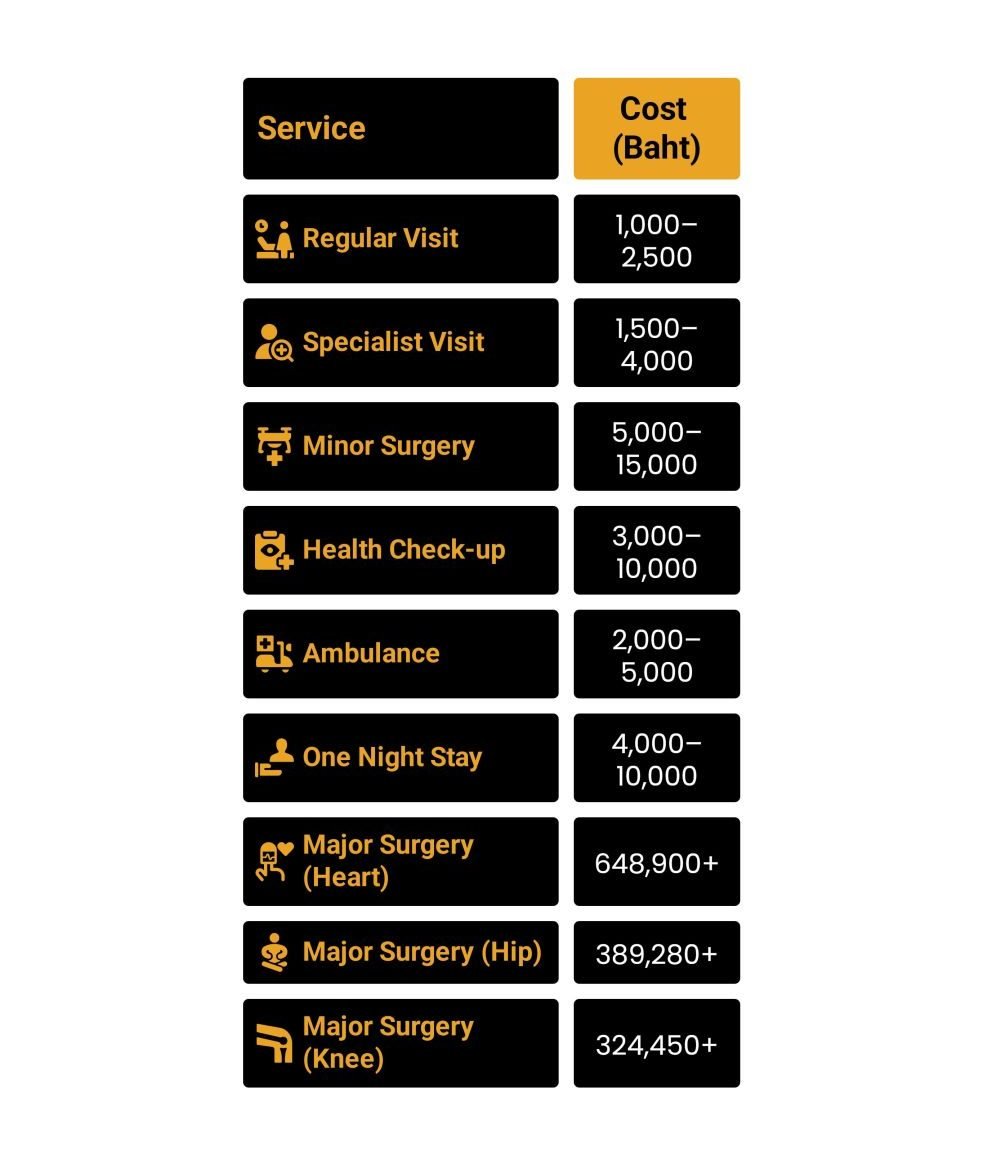Why long-term expats in Thailand say insurance is worth every baht
Private hospitals are popular because they are modern and have English-speaking staff, but treatment can be expensive without insurance

Thailand’s warm weather, low cost of living, and good healthcare attract many long-term expats, including retirees and remote workers. Life here feels easy and affordable, but medical costs can be high if something goes wrong. Private hospitals are popular because they are modern and have English-speaking staff, but treatment can be expensive without insurance. This is why many expats see health insurance as a smart choice. It helps protect savings, gives quick access to quality care, and brings peace of mind. For anyone planning to stay in Thailand long-term, insurance is worth every baht.
On this page
| Jump to section | Description |
|---|---|
| Healthcare costs can be unpredictable | Thailand’s private hospitals offer excellent care, but require upfront payments or large deposits for treatment, which can add up quickly, especially for long-term illnesses or emergencies. |
| Insurance protects your lifestyle and savings | Without insurance, a serious accident or illness could quickly drain savings. Good health insurance helps protect against unexpected costs, covering emergencies, planned surgeries, and more. |
| Staying healthy with full insurance coverage | Comprehensive insurance covers preventive care, routine doctor visits, vaccinations, and mental health support, ensuring your health remains a priority while living in Thailand. |
| Insurance for visas and long-term stays | For long-term stays or visa applications, health insurance is often required. Cigna provides plans that meet Thai government requirements and offer seamless documentation for immigration purposes. |
| What to look for in a good health insurance plan | When choosing a plan, ensure high coverage limits, direct billing to top hospitals, and international coverage if you travel. Always consider the insurer’s reputation and experience with expats. |
Healthcare costs can be unpredictable

Thailand’s private hospitals are known for great care, modern equipment, and English-speaking staff. But they usually ask for payment upfront or a large deposit before they will treat you—even in an emergency. This deposit can range from 50,000 to 200,000 Thai baht (about US$1,500 to US$6,000). If you don’t have insurance, you must show proof that you can pay. Sometimes, hospitals will not let you see specialists or use advanced tests until you pay.
Costs at private hospitals can add up fast:
- A regular doctor’s visit: 1,000–2,500 baht (US$30–US$80)
- Seeing a specialist: 1,500–4,000 baht (US$45–US$120)
- Minor surgery: 5,000–15,000 baht (US$150–US$450)
- Full health check-up: 3,000–10,000 baht (US$90–US$300)
- Ambulance service: 2,000–5,000 baht (US$60–US$150)
- One night in hospital: 4,000–10,000 baht (US$120–US$300), not including treatment
- Major surgeries: heart bypass (US$20,000+ or 648,900+ baht), hip replacement (US$12,000+ or 389,280+ baht), knee replacement (US$10,000+ or 324,450+ baht)

If you have a long-term illness or need regular specialist care, these costs can quickly become a big burden.
To avoid surprise bills and delays, many expats use international insurance providers like Cigna. Cigna offers plans that pay hospitals directly, so you don’t have to pay upfront. You also get 24/7 support and simple claims. For people living in Thailand long-term, having strong health insurance is a smart way to protect your finances and get fast, quality care when you need it.
Insurance protects your lifestyle and savings

One serious accident or illness in Thailand can quickly use up even large savings.
For example:
- Treatment for a motorbike accident (common among expats): US$6,000–US$60,000 (approximately 194,778 to 1,947,780 Thai baht), depending on the injuries
- Hospital stay for dengue fever: up to US$2,500 (approximately 81,157.50)
- Major surgeries like a heart bypass: more than US$20,000 (approximately 649,260)
Paying these bills yourself can be overwhelming and may lead to debt or hard choices about your care.
Good health insurance protects you from these big, unexpected costs. It usually covers:
- Emergency treatment
- Planned surgeries
- Specialist visits
- Ongoing care for long-term illnesses
- Preventive check-ups
- Medical evacuation if needed
Having insurance helps you keep your finances safe.
With the right plan:
- You can enjoy life in Thailand without fear of big medical bills.
- You don’t have to worry that an accident or illness will force you to leave.
- You can focus on your life, knowing your health and money are protected.
Staying healthy with full insurance coverage

Good health insurance in Thailand does much more than cover emergencies. Many plans include care that helps you stay healthy, not just treat sickness.
With comprehensive insurance, you often get:
- Preventive care and check-ups, so you can catch health problems early
- Routine doctor visits, vaccinations, and screenings, which lower the risk of serious illness later
Many plans also cover mental health support. Living in a new country can be stressful, and access to a psychologist or counsellor—either in person or online—can help you handle these challenges and feel more at ease.
Another helpful feature is the option to get a second opinion. This means you can ask international experts to review your diagnosis or suggest other treatments if you are unsure or worried about your care.
Cigna offers these extra services along with a wide network of private hospitals, easy cashless billing, and 24/7 support. This way, you get all-around help for both your body and mind while living in Thailand.
With the right insurance, you can enjoy your time abroad feeling confident and protected.
Insurance for visas and long-term stays

If you want to stay in Thailand long–term, health insurance is often required or strongly recommended. For example, if you apply for a retirement visa (Non-Immigrant O-A or O-X), you must show proof of insurance. Since October 2021, you need coverage with at least 3 million baht for hospital treatment, and you must keep this insurance active every time you renew your visa. This rule helps make sure you can pay for medical care without putting extra pressure on Thai hospitals.
Having trusted international insurance like Cigna makes the visa process much easier. Cigna’s plans meet or even go beyond the Thai government’s rules. They provide official documents that immigration officers accept, so you won’t face delays or problems. Cigna can also speak directly with immigration offices to confirm your coverage.
What to look for in a good health insurance plan

When you choose health insurance in Thailand as an expat, there are a few important things to check:
Coverage limits and exclusions
- Make sure the plan has high enough yearly limits to cover big costs like hospital stays, surgeries, and long-term care.
- Read the list of exclusions carefully. Some plans do not cover pre-existing conditions, risky activities, or cosmetic treatments.
Direct billing
- Choose a plan that offers direct billing to top private hospitals like Bumrungrad or Bangkok Hospital.
- This means the insurer pays the hospital directly, so you don’t have to pay first and wait for a refund.
International cover
- If you travel a lot or spend time in more than one country, pick a plan that works outside Thailand too.
- Some plans cover emergency care in your home country or worldwide (sometimes not including the USA).
Reputation of the insurer
- Always pick a company that is strong, trusted, and known for good customer service.
- It helps to choose an insurer with experience helping expats in Thailand.
Why many expats trust Cigna:
Cigna’s Global Individual Health plans are popular because they offer:
- High yearly cover starting at US$1 million (about 32,463,000 baht)
- Benefits for chronic illnesses, preventive care, and mental health support
- Flexible options (Asia-only, worldwide excluding the USA, or full worldwide cover)
- Direct billing with leading private hospitals, saving you time and stress
This mix of wide coverage, easy service, and international support makes Cigna a top choice for expats who want peace of mind while living in Thailand. You can easily apply online through Cigna’s official website or speak directly with a Cigna advisor for guidance.
Living in Thailand as an expat can be wonderful, but medical care is often expensive if you don’t have insurance. Private hospitals ask for big deposits before treatment, and serious health problems can quickly use up your savings. This is why many expats pick strong health insurance plans like Cigna’s.
These plans cover emergencies, regular check-ups, mental health care, and help with visa rules, all with easy direct billing. When choosing a plan, check the yearly limits, what is not covered, if it works overseas, and if the company is trusted. If you plan to stay long-term, you may also like this guide about why more retirees are choosing long-term health insurance over short-term options.
Latest Thailand News
Follow The Thaiger on Google News:
























